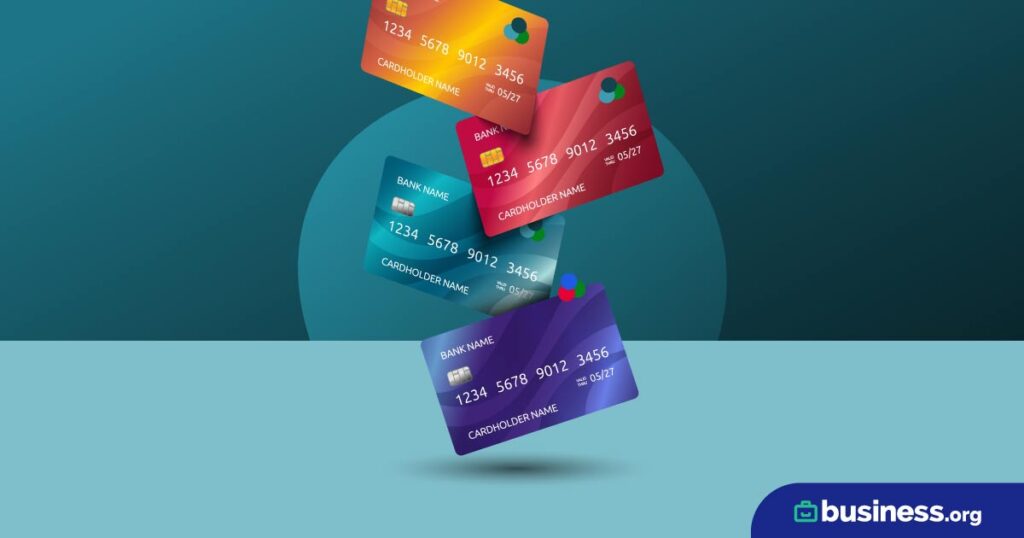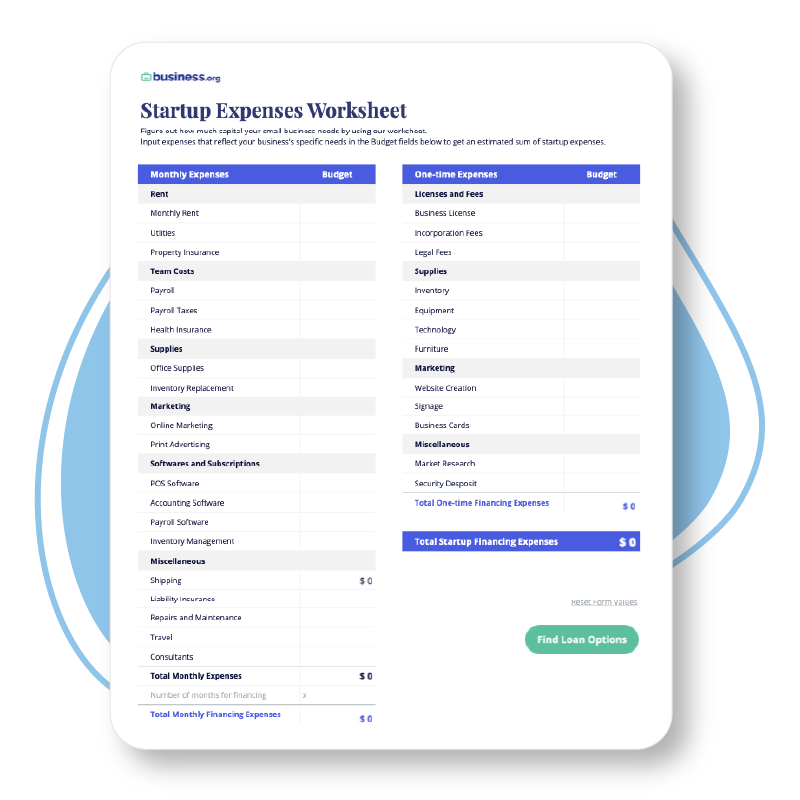We are committed to sharing unbiased reviews. Some of the links on our site are from our partners who compensate us. Read our editorial guidelines and advertising disclosure.
How to Come Up with a Business Name

Creativity fills many of us with dread, but it’s not impossible. In fact, you don’t need to be a poet or a painter to conjure a great business name. A good brand name will come to you if you simply use the right tools, techniques, and strategies.
If you’re not sure where to begin, we’re here to help. We’ve thought of a few steps to help you pin down that perfect business name.
1. Consider the qualities of a great business name
Before we really dive in, let’s explore what makes a stellar business name.
It’s short
If you write a list of household brands, most entries on the list won’t exceed ten characters—think Apple, Facebook, Skype, and Nike. That’s because people scan billboards, brick-and-mortar signs, and tiny mobile screens in seconds. In fact, research shows that a first impression takes only one-tenth of a second.¹ Since you have only a few precious moments, don’t burden a potential customer with too much text; make it easy to remember.
But what’s the optimal length? The sweet spot is in the neighborhood of six to eight characters.
It sounds good
Brands like StubHub, Best Buy, Cash App, and Coca-Cola are memorable and roll off the tongue. Catchy business names like these employ poetic devices like alliteration, assonance, and consonance. But you don’t necessarily need to know what these are to create a memorable business name—the most reliable tool is your ear. In other words, you don’t have to be a poet to recognize when something sounds good.
To truly test out a name, put it in a long sentence and put it in a short sentence. Play around with the pronunciation and listen to other people say it. Vocalize and listen—that’s the key to finding a notable business name.
Also, use intuitive pronunciation. Digital assistants are steadily growing more popular, but they aren’t perfect. We’ve all experienced the frustrating Alexa response “Sorry, I’m having trouble understanding you right now.” You don’t want that to be your customer's experience. To cover your bases, test all possible pronunciations of your business name (correct and incorrect). Ensure a digital assistant will send them to your business, even if they pronounce it incorrectly.
Easy pronunciation is especially important when you’re considering foreign words for your business name. To start, it helps to know if customers are comfortable or familiar with the words you’re contemplating. For example, consider the UK chain restaurant Pret A Manger. Because Pret A Manger mainly serves the UK and Europe, customers are familiar and comfortable with the French name—Americans, on the other hand, may struggle with the pronunciation.
It looks good
In addition to sounding great, a business name needs to look the part. Remember, a business name appears on a myriad of channels: videos, social media, billboards, store signs, websites, and printed documents. So open up Word or Illustrator to play around. (If you are not graphically inclined, find a friend or professional that can illustrate how the business name will look in different visual scenarios.)
Try different fonts and sizes. Add shapes or creative symbols. Add color. See how it looks in the middle of the sentence. See how it looks by itself. Finally, see whether that business name looks good on a tv, computer, and smartphone screen.
Also, for the most part, avoid non-standard spelling for a business name—it can often be confusing and frustrating. For instance, think Flickr, Tumblr, or Genesys; if you’ve only heard these said out loud, it can be tough to spell them out correctly. An unusual spelling can require extra brain power and time for customers to memorize. Tricky spelling can also hinder web search results. If customers can’t divine the spelling of your business name simply from hearing it, it will devastate your online presence, leads, and sales.
It’s relevant
Don’t be too clever or creative with your brand name (leave that for your slogan). Your business name should represent what your business does, how it interacts with customers, what it makes customers feel, or what sets it apart from other companies. (You don’t want customers confused or literally scratching their heads when they hear your name.) To test the relevancy of your business name, it’s a good idea to ask people what comes to mind when they hear it. If answers are all over the place, then it’s probably too abstract for your target market.
It’s professional
It always helps to search for business name ideas in an urban dictionary. (There might be a very good reason no one’s used that business name!) If your small business is international, also consider negative connotations with any of the countries you’ll be working in. The last thing you want is to accidentally offend your target audience.
By signing up I agree to the Terms of Use and Privacy Policy.
2. Use brainstorming techniques
To find a unique business name, do a few brainstorming sessions. Everyone brainstorms differently, so don’t limit yourself to the ideas listed here. You do you!
Create a word bank
Don’t underestimate the power of human creativity. Before relying on a business name generator, hold an individual or collective brainstorm. One technique to find words for a business name is to discuss or write words down that relate to your business—that’s a word bank.
Glance through a thesaurus and dictionary
When you’ve exhausted all possibilities and can’t think of another word, then—and only then—open a thesaurus or dictionary. Often, you’ll find new words and ideas by reading definitions or skimming a thesaurus.
Make a mood board
For more visual entrepreneurs, consider creating a mood board. A mood board is a collection of images, colors, fonts, and words that capture the tone of your business. So essentially, you gather any kind of visuals that you think apply to your business’s theme. By compiling images and other items, you can get an idea of what your business’s style and look will be.
Once you have a decent collection of ideas and images, you can think about what name would best fit your overall theme. What name would properly convey the vibe of your business? Be sure your name and your business’s style match.
Use a business name generator
As creative as your brain is, it can only generate so many words and ideas. To ensure you don’t miss out on any word combinations or ideas, it’s worth using a free business name generator that provides hundreds of business name combinations.
3. Check the name’s availability
So now you have some name ideas. But are they available? To avoid confusion and legal trouble, it’s important to see if other businesses have already claimed your preferred names.
Ensure you have a distinct name
Go through your short list of name favorites and confirm they haven’t already been claimed. In addition to legal complications, two companies with the same name or similar names can struggle with individual branding and search engine optimization (SEO). Branding becomes particularly difficult because customers can easily confuse the two companies.
An example of this is Macy’s and Macey’s. One is an internationally known department store and the other is a grocery store chain in Utah. In a verbal discussion, it’s difficult to determine which is which—think of how much harder it would be to communicate the difference if they were both in the same industry.
To check if your business name is one of a kind, do a few searches through popular sites and platforms:
Check local, state, and national business registrars
A distinct business name is also a legal matter. Local, state, and federal governments often require businesses to register their business names. And because local and state laws can differ, you’ll need to consult both your local and state business databases. Just take a look at the registrar sites for each. Or for a resource that includes all 50 state databases, rely on Harbor Compliance. For national business registration, search the United States Patent and Trademark Office (USPTO) database.
Verify domain availability
Next, if you’re planning to have a website for your business—instead of simply using sites like Etsy and Facebook for e-commerce and advertising—you’ll need a unique website domain. While you can search for specific URLs yourself, it’s easier to employ domain registrars like Namecheap or GoDaddy when checking domain names.
4. Register your business’s name and domain
If you found a unique business name that has a website domain, a Facebook Business Page, and social media accounts available, register it. If you don’t register your business name, your company name can be freely and legally used by another company.
File a Do Business As (DBA)
If the business name you operate under is different from your company’s legal entity name, be sure to file a Do Business As (DBA). A DBA doesn’t necessarily protect your business name from being used by other companies—multiple companies within one state can go by the same DBA name—but it does let your state, county, or city know what alternate names your company uses to conduct business. If you do want to protect your business name from other companies, register your company’s entity name with your state or trademark it.
Many states and local areas require DBAs, but if you’re a sole proprietor, you can most likely skip the DBA altogether with one exception: you would like to use a business name rather than your personal name.
Register your business entity name
Most of the time, businesses other than sole proprietors are required to register their business entity name. The good news is that it protects your business’s name at the state level. This process does cost cash and time to fill out paperwork and get approval, but if you don’t fill it out correctly or if you fail to do a little double-checking beforehand, the state could reject your application and you could lose your money.
Most often, business entity names are rejected because another business in the state is already using your chosen name, or your business name is too close to the name of an existing business. So it’s imperative to check the availability of your name before registration.
When you register for your business entity name, you’ll need to define your legal business structure.
Consider filing for a trademark
If you plan on doing business outside of your state, consider trademarking your business name, especially if your business uses an e-commerce platform.
You can apply for a trademark through the United States Patent and Trademark Office (USPTO), but before you submit an application, search the USPTO database to ensure your chosen name isn’t already trademarked. If your name isn’t already taken and your application is approved, your business name will be federally protected.
Register your domain name
If you used a domain registrar to check the availability of your domain name, you can simply purchase that domain from the registrar. You can also purchase your domain name through a web hosting provider.
Look into your next steps
Once you have a name and are ready to start your business, you’ll need to take a couple of extra steps to properly prepare.
Building your website
You’ve got a great business name and a solid idea. But how do you get your business out there? One of the best ways is to build your own website where customers and clients can explore your products or services and get to know your business.
Smaller businesses that don’t anticipate a ton of traffic or growth may do just fine with a basic website builder. But if you’ll have a decent amount of traffic on your site—or foresee getting more in the near future—you’ll need web hosting services. Choosing a web hosting provider can be tough, but with a variety of providers and plans out there, you’re sure to find something that fits your business perfectly.
Securing capital
For any business, it’s helpful to be financially prepared. Personal savings and family and friend contributions can help, or you can turn to banks, credit unions, or alternative lenders for a small-business loan.
The takeaway
Naming your business requires thought and time, but when done right, it provides a competitive edge. Start by brainstorming and researching, and pick a business name that’s relevant, short, catchy, and professional. Then once you have a few ideas, check the name’s availability, and finally, be sure to register your brand name in your state or county. Even if your chosen business name doesn’t win any national marketing awards for creativity, it’s better to have a name that resonates with potential customers and clients.
Sources
- Association for Psychological Science, “How Many Seconds to a First Impression?”





